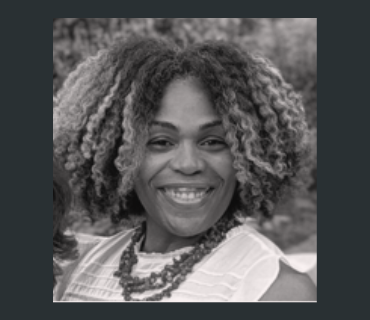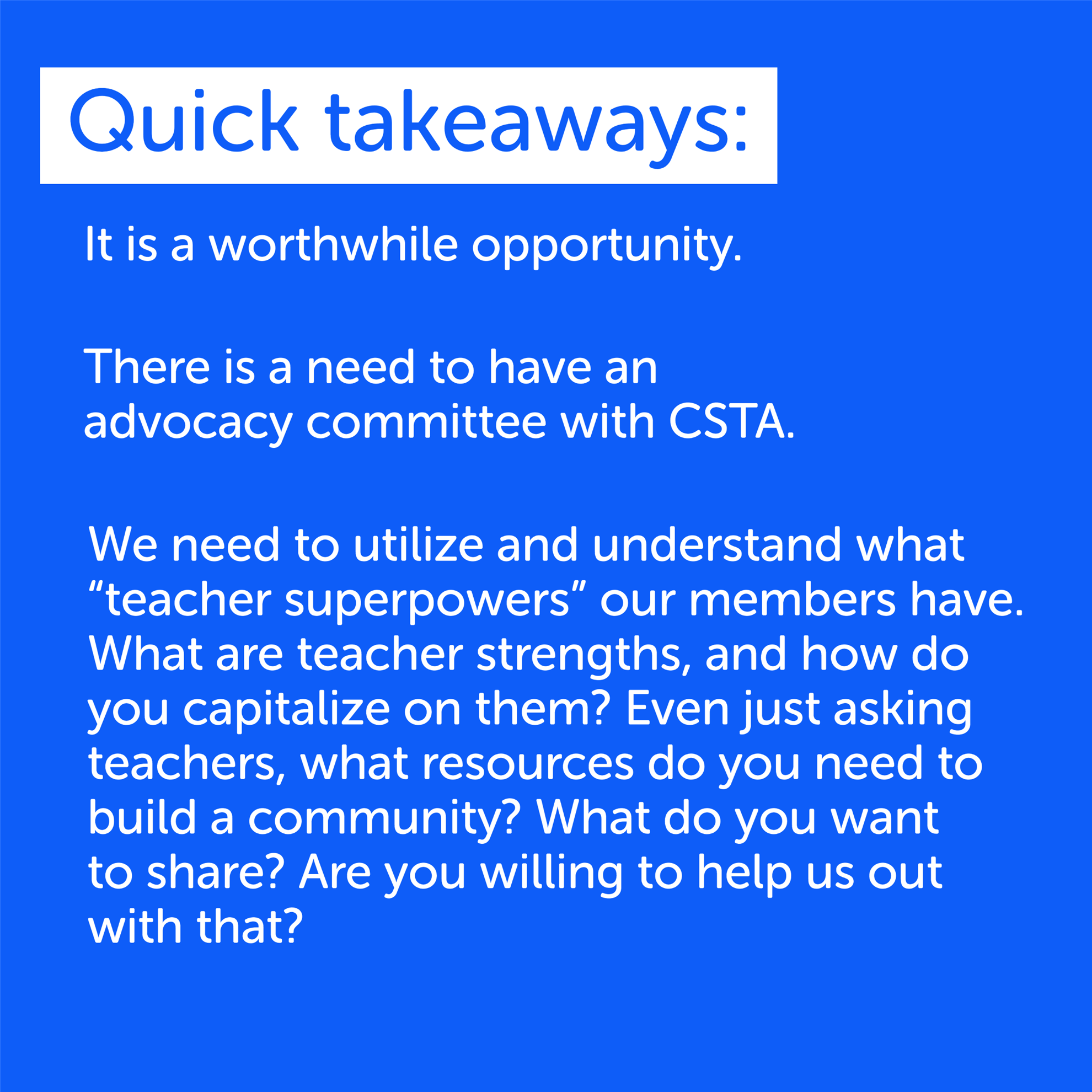
Faythe Brannon works at the Office of Computer Science at Chicago Public Schools as a High School Curriculum Specialist. She taught CS at Harlan Community Academy before this role. She is also the Treasurer for the CSTA Chicago Chapter.
Full Story
![]() Faythe Brannon works at the Office of Computer Science at Chicago Public Schools as a High School Curriculum Specialist. She taught CS at Harlan Community Academy before this role. She is also the Treasurer for the CSTA Chicago Chapter. We spoke with Faythe earlier this month about her experiences with the 2020 CSTA Virtual Conference and an advocacy initiative with representatives on Capitol Hill.
Faythe Brannon works at the Office of Computer Science at Chicago Public Schools as a High School Curriculum Specialist. She taught CS at Harlan Community Academy before this role. She is also the Treasurer for the CSTA Chicago Chapter. We spoke with Faythe earlier this month about her experiences with the 2020 CSTA Virtual Conference and an advocacy initiative with representatives on Capitol Hill.
In five words, can you describe how the past few months have been for you?
Unpredictable, Painful, Raw, Revealing, Awakening
What is one thing that has surprised you this week?
I continue to be surprised by the impacts of the pandemic. We are a few weeks away from going back to school, and we do not have a clear picture of what the year will entail. Will we be remote learning the entire school year? I hope we find a cure soon so that we can return to in-person instruction!
As we are talking, you are supporting a PD event. Can you tell me more about this?
Exploring Computer Science is a year-long, research-based, high school intro-level computer science curriculum, and teacher professional development program that focuses on broadening participation in computing. The Office of Computer Science provides support to teachers that are implementing the curriculum. The PD program consists of two week-long summer institutes plus quarterly meetings throughout the year. Through the training, we seek to develop teachers’ confidence in course content. Furthermore, we aim to provide meaningful educational opportunities to teachers and students who typically encounter barriers to access.
The PD focuses on three areas – Equity, Inquiry, and CS content.
- Inquiry: Teachers focus on the problem-solving process instead of only emphasizing the “right” answer. Engage students with hands-on activities that allow students to apply and test what they know. Connect computer science concepts to students’ prior knowledge. Engage students with questions designed to stimulate their curiosity about how the world works.
- Equity: We seek to provide meaningful educational opportunities to teachers and students who typically encounter barriers to accessing computer science. Culturally-responsive teaching that makes computer science relevant to students’ personal experiences. Develop caring and respectful relationships. Maintain high expectations for all students that counter stereotypes about who should excel in CS
- CS content: We believe in a holistic approach to computer science that goes beyond programming and opens students’ eyes to the current demands and opportunities within CS. Focus on the underlying problem solving and critical thinking necessary to explore CS. Scaffold learning of CS topics.
Can you tell me a little bit more about the Exploring Computer Science curriculum? Can you share any resources with us?
Exploring Computer Science is a K-12/University national program committed to democratizing computer science knowledge by increasing learning opportunities at the high school level for all students, with a specific focus on access for traditionally underrepresented students. The curriculum is structured, strategic, and creative. It consists of six units covering Human-Computer Interaction, Problem Solving, Web Design, Introduction to Programming, Computer and Data Analysis, and Robotics. For additional information, please check the curriculum website.. Exploring Computer Science prepares our students for the advanced level CS courses by changing mindsets from the Consumer to the Creator of CS!
What advice would you share with teachers that may not have the support of a district CS office?
We are fortunate to have a supportive CS district office; however, some teachers from other districts may not have the same support. The barrier further emphasizes the need and importance of CSTA chapters. Our teacher community can provide love and support to teachers as we bring awareness to parents, school leaders, politicians, and other key stakeholders.
What has your CS journey looked like, and how is it different than how you envisioned it?
Like many, teaching was my second career. When I was teaching at Harlem Community Academy, I became interested in CS after attending the Exploring Computer Science PD workshop. The workshop gave me the tools to learn and grow in a comfortable, non-judgemental space. The experience changed my understanding of how to engage students effectively. It starts with meeting students where they are at! For me, that means doing what it takes to create a culture and climate that allows students to be comfortable creatively exploring computer science.
What does your fall look like in the time of COVID-19 and work?
My role as the HS Curriculum Specialist is to support teachers. This fall, I will continue to support them as they implement CS remotely. They will face several barriers, such as the pandemic’s social and emotional impact on students that may affect engagement.
Currently, my office is trying to carefully take in the student’s perspective. We need to consider what the biggest barriers will be for students so that the classroom is still engaging even if it’s just a screen. Teachers need to understand how to get students excited, and how can you still create a space for them to take ownership in the classroom. Something to consider is the vulnerability of virtual classrooms, and that some students may have an unkempt or unsafe environment and they do not feel comfortable sharing their video. We need to have extreme empathy and understanding for the student.
How did you get involved in CSTA? Also, please describe your experience with being part of a CSTA chapter.
I was and will always be a teacher. When I joined the OCS/CS4all team, I wanted to make sure that I was actively involved in the CS teacher community, and CSTA allowed that. My mission is to make sure that CS teachers are supported even beyond the scope of my position at OCS. To help our community continue to grow in the right direction, I feel we, as CS teachers, need to join together to lean on each other as we develop into a mighty and robust alliance. The CSTA Chicago chapter leadership team is striving to plan future meet-ups and conferences to help us. Creating structures within CSTA Chicago has been difficult, but it is vital to cultivate the chapters as a place of support and community.
 As a Chapter Leader, last month, you had an opportunity to participate in virtual Capitol Hill meetings. Did you have a strategy going into these meetings or intended outcome?
As a Chapter Leader, last month, you had an opportunity to participate in virtual Capitol Hill meetings. Did you have a strategy going into these meetings or intended outcome?
CSTA Chicago Suburban Chapter President Steve Svetlik and I spoke with a representative from Dick Durbin’s (IL) team. Our goal was to convey the importance of providing a quality CS experience in K-12 and the need for financial support from our political advocates. We discussed the changes in what CS meant to students and society.
The conversation focused on how to provide a space for CS. Every career is impacted by CS, and getting that understanding through to our leadership was vital. Some schools may not be able to offer multiple CS courses, so how can we provide that experience for students in other forms? In our conversations with representatives, it conveyed that clubs, internships are also a space for connection to CS.
What were two sessions from the 2020 Virtual Conference that were of value to you?
The two most valuable sessions for me were Critical Conversation about Racism and Computer Science and Designing Equity-Focused Professional Development. The Critical Conversation about Racism and Computer Science workshop provided fruitful discussions about bias and prejudices within the CS classroom and community. The panelists discussed racism in CS and offered compelling examples of how we can be anti-racist advocates. The Designing Equity-Focused Professional Development workshop discussed ways to provide equity-focused PD to teachers. Charity Freeman introduced the Exploring Computer Science Unit Zero PD. The training will allow teachers to discuss best practices and strategies for starting the school year off right with intentional methods for creating an engaging, collaborative, inclusive learning environment.


 As a Chapter Leader, last month, you had an opportunity to participate in virtual Capitol Hill meetings. Did you have a strategy going into these meetings or intended outcome?
As a Chapter Leader, last month, you had an opportunity to participate in virtual Capitol Hill meetings. Did you have a strategy going into these meetings or intended outcome?